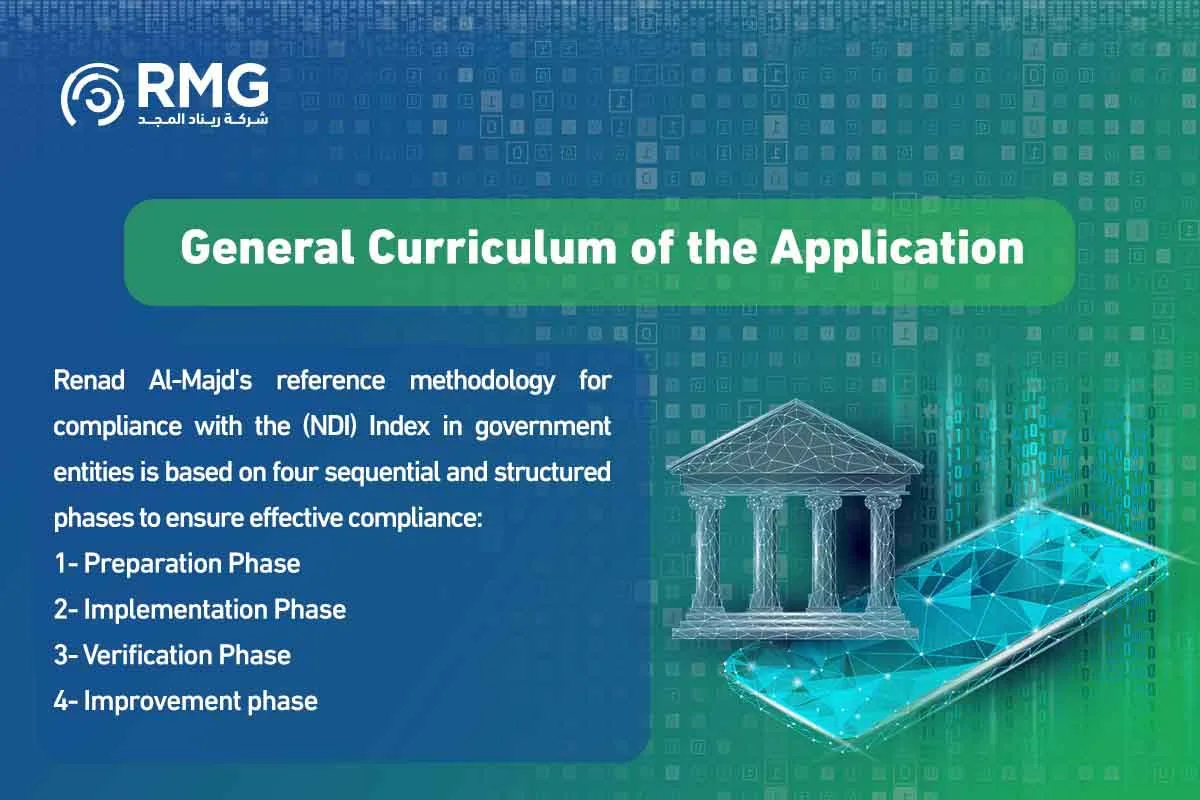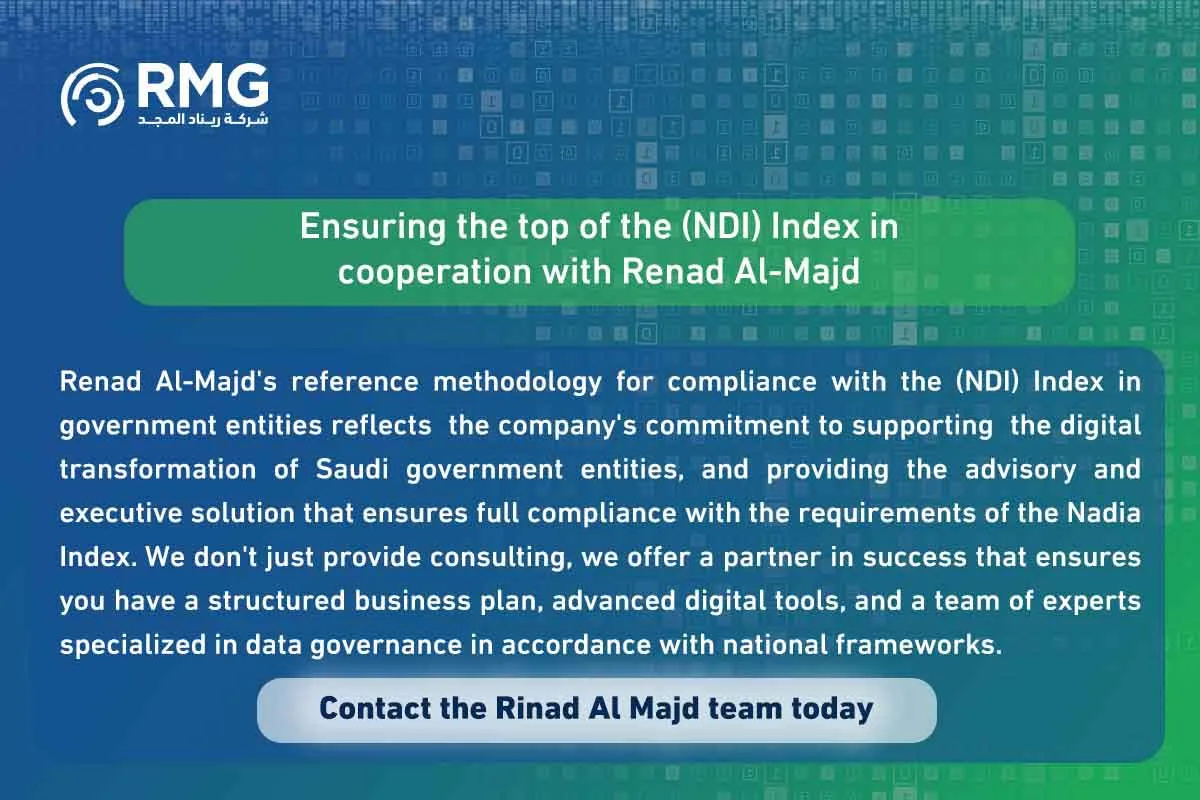Blog Body
Renad Al-Majd’s reference methodology for compliance with (NDI) Index in government entities is defined to achieve full compliance and raise the level of maturity in Saudi government entities. Details of the 14 areas of (NDI) Index, digital tools, and action steps approved by the National Data Management Office (NDMO). Discover the ideal timeline for sustainable compliance.
Data Governance in the Kingdom: Why is the Illumination Indicator the Compass?
As part of the ambitious digital transformation journey led by the Kingdom of Saudi Arabia towards achieving the goals of Vision 2030, data has become the most valuable strategic asset, and (NDI) Index issued by the Saudi Data and Artificial Intelligence Authority (SDAIA) has become the crucial national measure for assessing the efficiency and readiness of government entities in its data management and governance. Excellence in this indicator is not just an achievement, but a direct indicator of the entity’s ability to make effective decisions, enhance transparency, and provide integrated digital government services.
Here, Renad Al Majd’s reference methodology for compliance with (NDI) indicator in government entities stands out as the optimal solution and the guided compass. Designed to cover a flexible time cycle ranging from 12 to 24 months, this reference methodology is operationally realistic and takes into account the different levels of technical and organizational maturity of each entity. Entities with high readiness can achieve compliance in 12 months, while entities that require infrastructure development receive a plan that extends to 24 months. Renad Al-Majd’s reference methodology for compliance with (NDI) Index in Government Entities is a flexible framework that ensures the gradual and sustainable application of Nadaa requirements, while fully adhering to the accuracy of the evidence.
Strategic objective from compliance to sustainable maturity
The main objective of Renad Al-Majd’s reference methodology for compliance with the Nadaa Index in Government Entities is to provide an integrated advisory and operational framework to ensure that the level of maturity and national compliance is raised in accordance with the best practices adopted by the National Data Management Office (NDMO).
To ensure the success of the project, Renad Al-Majd begins with an in-depth analysis process through a comprehensive Current State Assessment. During the first weeks, a foundation workshop will be held involving the entity’s teams, the National Data Management Office, and the Renad Majd Consulting Team to identify:
- Target maturity level: which is realistically determined based on the entity’s readiness (12 to 24 months).
- Actual scope of application: Identify priority departments or apply the scope at the entire enterprise level.
- Supported technical tools: Frame the use of available platforms such as ECM, DQ Tool, and Metadata Repository.
- Performance Indicators and Success Criteria (SKPI/OKPI): Define clear metrics to ensure continuous progress and improvement.
This rigorous foundation ensures that the methodology is tailored to the entity’s realities, establishing a clear path towards achieving sustainable compliance.
Frame of Reference: The 14 Areas of the Illumination Index according to the Third Cycle
Renad Al-Majd’s reference methodology for compliance with the Nadia Index in government entities is based entirely on the third cycle of (NDI) Index, which focuses on measuring compliance with national data management controls and specifications. The index covers 14 key areas and more than 478 standard requirements covering the four dimensions of data governance: organizational, operational, security, and strategy.
Renad Al-Majd provides a detailed analysis of the distribution of responsibilities and tools required across these areas to ensure complete clarity in implementation:
| Domain (Code) | Strategic importance in compliance | Responsible Principal Departments | Supporting technical tools |
| Data Governance (DGOV) | Establishing a decision-making structure and policies. | Data Office – Legal Affairs – Executive Leadership. | Policy Record, Committee Structure, Policy Documents. |
| Data Quality (DQ) | Ensuring the accuracy, completeness and reliability of the data. | Data Management – Information Technology. | Quality control platform, automated measurement tools, quality reports. |
| Metadata (MDC) | Document the meaning and structure of data (data dictionary). | Data Desk – Digital Transformation. | Metadata Repository, a central data dictionary. |
| Content Management (DCM) | Governance of electronic documents and records. | Document Management – Human Resources – Technical. | Content Management System (ECM), document logs. |
| Data Modeling and Structuring (MOD) | Design database structures effectively. | Digital Transformation – Information Technology. | ERD tools, data flow maps. |
| Reference Data (MDM) | Consolidate the organization’s key data (such as supplier data). | Data Office – Operational Departments. | Master Data Platform, Sync Models. |
| Business Intelligence (BI) | Turn data into value to support the decision. | Business Intelligence – Strategic Planning. | BI Dashboard, Performance Dashboards, Operating Indicators Reports. |
| Data Integration (INT) | Sharing and integrating internal and external data. | Information Technology – Enterprise Architecture. | API Gateway, ESB Platform, Sharing Agreements. |
| Protection of Personal Data (PDPL) | Compliance with the Personal Data Protection Regulation. | Cybersecurity – Data Management. | Privacy System (PDMS), Privacy Notices. |
| Data Classification (CLS) | Identify data sensitivity and priority for protection. | Cybersecurity – Data Management. | Data classification system, classification models. |
General Curriculum of the Application: Preparation, Application, Validation, and Improvement Course
Renad Al-Majd’s reference methodology for compliance with (NDI) Index in government entities is based on four sequential and structured phases to ensure effective compliance:
- Preparation Phase: It starts with data collection, gap analysis, and the appointment of responsible teams from the entity and their alignment with the Renad Al-Majd Consulting Team.
- Implementation Phase: This is the actual implementation phase, which includes the formulation and updating of policies, building evidence, and implementing the technical and operational initiatives necessary to meet the 478 requirements.
- Verification Phase: A critical phase that involves a careful review of all evidence completed in accordance with the SDAYA Admission Criteria. Renad Majd’s expertise is relied upon to ensure the quality of evidence prior to official filing.
- Improvement phase: After raising and receiving feedback, an ongoing corrective plan is prepared to handle and close feedback, ensuring that maturity is raised for the next assessment cycle.
Roles and Responsibilities: Integrating Teams for Compliance Success
Renad Al Majd believes that successful compliance with (NDI) Index requires tight institutional collaboration. Roles and responsibilities are clearly defined, with Renad Al Majd acting as the external advisory support that manages the evaluation process and closes the gaps, while the internal departments of the entity play indispensable executive roles:
- Data Management Office (Entity): General coordination and compliance plan management.
- Information Technology (Entity): Development of supporting technical systems and platforms (platforms).
- Cybersecurity (entity): ensuring data protection and privacy (data classification and PDPL).
- Renad Al-Majd Company (External): Specialized consulting support, evaluation management, and follow-up on evidence readiness.
Renad Glory Support Tools: Accelerate Digital Compliance
To ensure the efficiency and effectiveness of the compliance process, and to facilitate the application of Renad Al-Majd’s reference methodology for compliance with (NDI) Index in government entities, Renad Al-Majd offers a set of digital tools that contribute to accelerating the transformation process and raising readiness:
- Data Governance Toolkit: An integrated package of ready-made templates, assessment forms, and checklists to facilitate the construction of guides and policies in accordance with national standards.
- (NDI) Tracker: An in-house digital system specifically designed to track evidence readiness, update date, and document reviews, ensuring that no requirement is missed.
- RMG BI Board: An intelligent dashboard for real-time progress and compliance monitoring, allowing executive leadership to make quick corrective decisions based on accurate performance indicators (percentage of evidence completed, compliance level for each domain).
Continuous Monitoring and Improvement: Sustaining Post-Evaluation Maturity
Renad Al-Majd’s reference methodology for compliance with the Nadaa Index in government entities confirms that compliance with (NDI) Index is not a one-time event, but a journey of continuous improvement. Renad Al-Majd ensures that the entity continues to enhance its maturity even after the completion of the evaluation cycle through:
- Updating the manuals on a semi-annual basis: to ensure that it is keeping pace with any amendments in national frameworks or internal changes in the region.
- Monthly follow-up meetings: to review progress and identify any potential challenges.
- Prepare a quarterly maturity report: Provides executive leadership with an objective assessment of the level of maturity.
- Implement internal training campaigns: to deepen awareness and culture of data governance in all departments of the entity.
Ensuring the top of the Nadaa Index in cooperation with Renad Al-Majd
Renad Al-Majd’s reference methodology for compliance with the Nadia Index in government entities reflects the company’s commitment to supporting the digital transformation of Saudi government entities, and providing the advisory and executive solution that ensures full compliance with the requirements of (NDI) Index. We don’t just provide consulting, we offer a partner in success that ensures you have a structured business plan, advanced digital tools, and a team of experts specialized in data governance in accordance with national frameworks.
Are you seeking to ensure the highest ranking for your government entity in the next cycle of (NDI) Index?
We invite you at Renad Al-Majd to request an integrated and customized presentation on Renad Al-Majd’s reference methodology for compliance with (NDI) Index in government entities. Get in touch now to begin your journey towards structured compliance, and harnessing the power of data as an effective strategic asset..






















